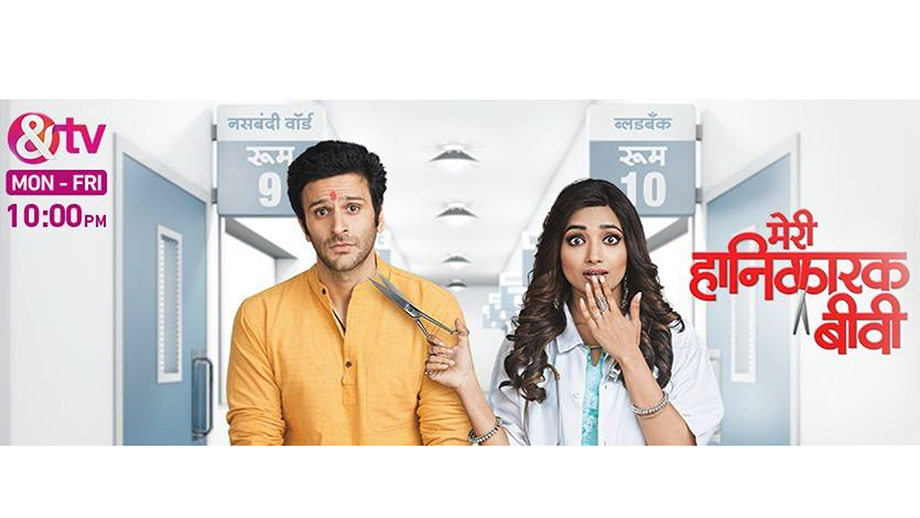Until now, the Hindi GEC space was dominated by ichhadhaari naagins, weepy sati-savitris and sappy love stories. Well, all that is about to change. After giving Indian television viewers hat-keshows such as Hamari Bahu Rajnikant, Bhabhiji Ghar Par Hai and Badho Bahu, &TV is set to touch upon a topic that is delicate, complex and spoken about only in hushed tones, if at all.
Produced by Sonali Jaffer, under her banner Full House Media, Meri Hanikarak Biwi, the latest offering from &TV, is based on the touchy topic of vasectomy; yes, really! Go figure! In a country where male pride largely centres on a man’s virility and ability to spawn progeny, vasectomy is a topic not many TV producers would want to touch with a barge pole. Yet, this is what the new serial from the &TV stables is all about, albeit broached with an element of humour in it, to offset the seriousness of the subject. Still, you have to acknowledge that it is, by all accounts, a hugely progressive concept for Indian Television.
The male protagonist, Akhilesh Pandey (played by hunky Karan Suchak), is a happy-go-lucky simpleton from Benares. Jia Shankar plays Ira, a medical intern from Mumbai, who visits Benares to set up a health camp. So, as the promos go, the plot is about Ira erroneously performing a vasectomy on Akhilesh, though how that will happen is still a mystery. Akhilesh’s trials and travails, after being shorn of his ‘manliness’, form the rest of the plot.
But wait, there’s also a sub-plot- Akhilesh’s father, Brijesh Pandey, played by Nasir Khan, lives in Mumbai, hasn’t visited his family in Benares in the last 25 or so years, and has another wife in the city, from whom he even has three spoilt, rich kids. Sucheta Khanna plays the role of the wife in Benares, while Anjali Mukhi is the wife in Mumbai.
The storyline is particularly interesting, given the revolutionary concept. The dialogues are very well-written, funny, witty and eliciting laughter where required. In fact, the dialogues are a huge plus in the show’s favour. The show also boasts delightful visuals, bringing alive the sights, sounds and colours of Benares for viewers. Another plus is the fast pace of the proceedings. The show doesn’t drag even a bit and keeps us glued to the TV screen, lest one misses something.
Well, that was the good. Now for the bad…..
While Meri Hanikarak Biwi focuses on a decidedly non-stereotypical subject, that of vasectomy, the show is irritatingly chock-full of stereotypes, some of which are really grating to the nerves.
Sucheta Khanna, along with the other characters shown in Benares, speaks in the typical UP dialect- hamaar, kaunhu, bitwa, etc; which makes one wonder whether she lives in Benares or the back of nowhere. Do people actually speak like that in real life in a comparatively big city as Benares, and in the age of the internet? Funnily even, the younger kids in Benares all speak in normal Hindi.
Anjali Mukhi is the archetype of the modern wife- and must therefore intersperse all her sentences with that done-to-death phrase, ‘like, seriously’. How typical, if we must say.
Akhilesh is a Hanuman bhakt, and of course, staying miles away from girls goes with the domain. So, Akhilesh never looks any girl in the face, recognises the neighbourhood girls only by their footwear and calls every girl, deviji.
Ira is the quintessential modern Indian girl, which, according to the scriptwriters, can only be proven by making her spout words such as ‘condoms’ with nonchalance. And oh yes, when she mistakes Akhilesh to be an eve-teaser, a simple slap on the face won’t do for our ‘21st-century-Indian-girl’. It has to be a neat blow to the family jewels. So there!
Stereotypes aside, another grouse we have with the show is the improbability of some of the scenes. In one sequence, Akhilesh uproots a huge, full-grown banyan tree, with his bare hands mind you, and drags it to his house, so that his mother can perform the Vat Savitripooja. Like, seriously! We all know that banyan trees are some of the strongest and longest-living trees on earth, living up to a thousand years even. But guess, the scriptwriters don’t know that.
The acting is quite good. Karan Suchak is believable in the role of a doting, obedient son, Sucheta Khanna is her usual, competent self, while Nasir Khan’s acting is measured and understated. Jia Shankar’s performance is nothing to sing paeans about, but isn’t so bad as to be dissed either. Anjali Mukhi’s performance is a tad bit OTT and gets on one’s nerves in some scenes. She needs to rein in her horses, in our opinion. Shehams eases her way through the role of the rich, high-society woman, a character immortalised by Ratna Pathak Shah in Sarabhai Vs Sarabhai.
The concept of the show is truly radical, which is why it is bound to grab eyeballs. The Indian television audience is itching to watch content that is progressive, different and appealing.
IndianWikiMedia would rate it 3 out of 5 stars.
(Written by Rashmi Paharia)


